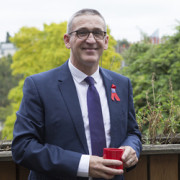The fight against HIV has for the past four decades went hand-in-hand with the fight to end inequalities across society, including racism. Put bluntly, we won't end new cases of HIV in the UK until we fully address the issue of race equity.
That is why I've signed an open letter to the Prime Minister, organised by the Runnymede Trust, setting out why the recent report by the Commission on Race and Ethnic Disparities published in March 2021 falls far short of expectations. The letter references the substantial and incontrovertible body of evidence that confirms beyond doubt that the incidence of direct and institutional racism prejudices the UK’s Black and minoritised communities.
As the UK’s leading sexual health and HIV charity, we have a responsibility to speak out against social inequalities that are often the determinants of HIV transmission and poor sexual health. We're committed to doing more to addressing these inequalities but we can't do it alone, we need decisive leadership and action from the Government – the recommendations of this report do not suggest this will happen any time soon.
This is despite the Government’s own Race Disparity Unit recognising that HIV is a health inequality that is disproportionately shouldered by people of colour. Black African, Black Caribbean, Asian and other Black people are at higher risk of experiencing a late HIV diagnosis compared to other populations. This is exacerbated by the fact that people of colour, in particular Black African women are impacted by not being offered a HIV test when attending a sexual health clinic.
Therefore, the report’s omission of any references to HIV diagnoses in the UK or any recommendations on how to tackle this inequality is particularly disappointing.
Quote textWe are clear: progress in HIV that is only felt by some isn’t progress at all.

In a recent report on the impact of COVID-19, leading academic Professor Michael Marmot found that combatting the social determinants of health inequalities, including recognising and dealing with structural racism is required to narrow the gap in health outcomes faced by Black and minoritised communities.
We couldn’t agree more and we're committed to playing our part in addressing inequalities and properly meeting the needs of groups impacted by HIV - but we must do more and do better. As a charity, we'll be taking further steps to stamp out any forms of racism and discrimination, and remove structural barriers that stand in the way of us being a more representative and inclusive organisation for the communities we support. As CEO, I want us to become an exemplar for the voluntary sector – a sector which must do more to confront race equity issues.
Ending new cases of HIV within the decade and improving the nation’s sexual health requires a step-change in health policy and services, but it also requires an urgent change in rooting out barriers and inequalities faced by Black and minoritised communities.
We are clear: progress in HIV that is only felt by some isn’t progress at all. Alongside my colleagues, I won’t hold back on Terrence Higgins Trust’s mission to address and continue to step up in our work to fully support all the communities we serve.



